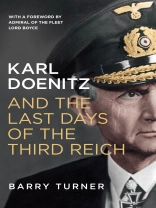Among the military leaders of the Second World War, Grand Admiral Karl Doenitz remains a deeply enigmatic figure. As chief of the German submarine fleet he earned Allied respect as a formidable enemy. But after he succeeded Hitler – to whom he was unquestioningly loyal – as head of the Third Reich, his name became associated with all that was most hated in the Nazi regime.
Yet Doenitz deserves credit for ending the war quickly while trying to save his compatriots in the East – his Dunkirk-style operation across the Baltic rescued up to 2 million troops and civilian refugees.
Historian Barry Turner argues that while Doenitz can never be dissociated from the evil done under the Third Reich, his contribution to the war must be acknowledged in its entirety in order to properly understand the conflict.
An even-handed portrait of Nazi Germany’s last leader and a compellingly readable account of the culmination of the war in Europe, Karl Doenitz and the Last Days of the Third Reich gives a fascinating new perspective on a complex man at the heart of this crucial period in history.
About the author
Barry Turner is an acclaimed historian and Editor of The Statesman’s Yearbook (Palgrave) which has recently celebrated its 150th anniversary. His most recent books are Beacon for Change (Aurum Press, 2011) and with Tony Rennell, When Daddy Came Home (Arrow, 2014), described as ‘fascinating’ by the Daily Mail. He lives in London and south-west France.












